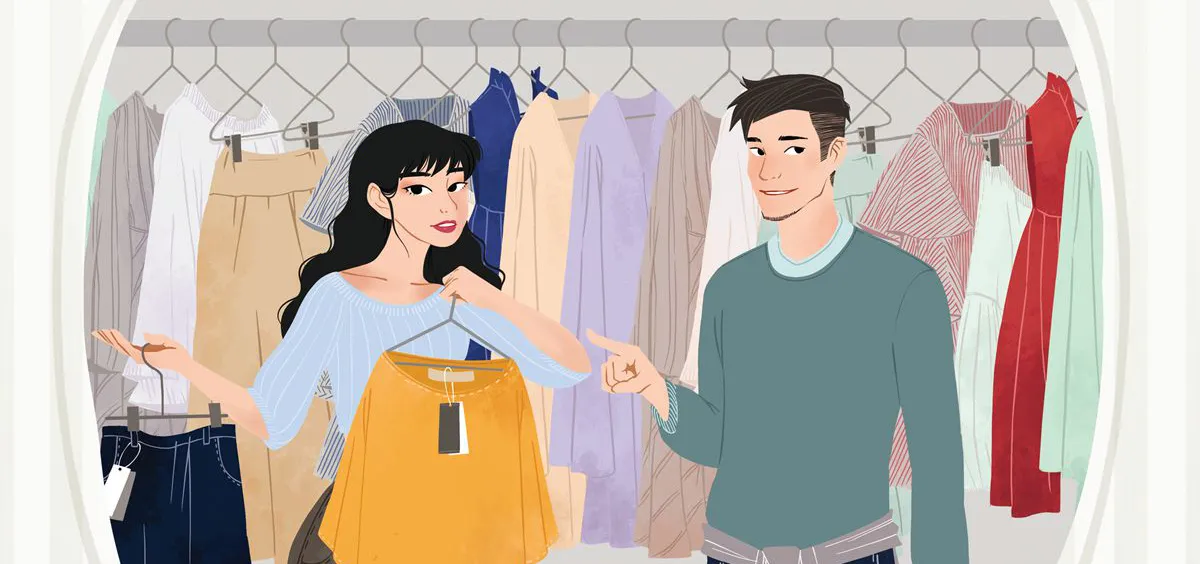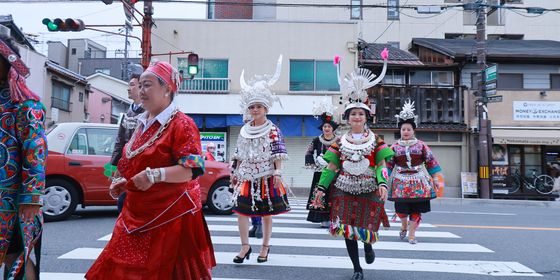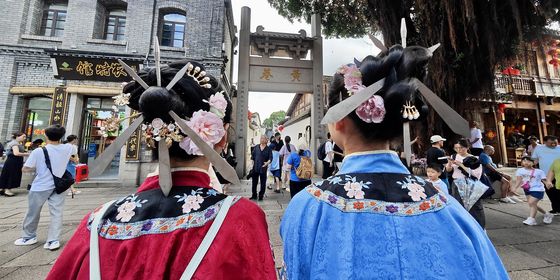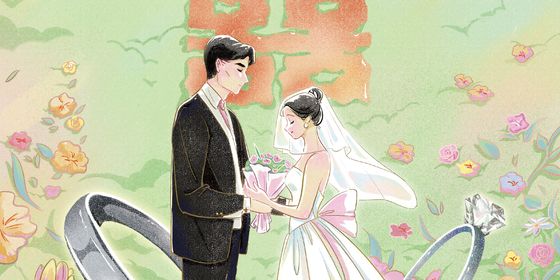Surviving the fatal ‘how do I look’ question
You are what you wear—or, as the ancient saying goes: “The clothes make the man, just like the saddle makes the horse.” People have always used fashion to signal their wealth, creativity, or taste, as much as covering up or keeping warm.
But how do you tell if an outfit looks good? Some people turn to their friends, when they feel like they can’t trust the mirror or a pushy salesperson. Such conversations, though, are studded with landmines. Anyone who has been asked the fateful question “How do I look in this?” knows the internal struggle—being truthful without causing offense, or complimenting without sounding insincere. Some language skills are necessary to come out of these conversations with your friendships intact.
Flatter cleverly
Positive feedback is usually pretty safe, but flattery is also a science. A vague compliment like “you look good” is meaningless, and may even raise suspicions that you’re being less than truthful. Name specific features you like about the look:
A: How do I look in this dress?
Wǒ chuān zhè tiáo qúnzi hǎokàn ma?
我穿这条裙子好看吗?
B: You look great! The length suits you, and you look very slim!
Tèbié hǎokàn! Chángdù fēicháng héshì, hái xiǎn shòu!
特别好看!长度非常合适,还显瘦!
Be careful, though: Someone insecure about their weight might interpret this to mean you think they normally look fat. If you aren’t close, or simply want a safer option, focus on the clothes rather than the body—any outfit has its good points:
A: What do you think of these jeans?
Nǐ juédé zhè tiáo niúzǎikù zěnmeyàng?
你觉得这条牛仔裤怎么样?
B: They are perfect for this time of year!
Zhège jìjié zhènghǎo chuān!
这个季节正好穿!
If you really can’t find anything good to say, try:
It’s nice to see you try a different style!
Nǐ chángshì yīxià xīnfēnggé yě tǐng hǎo de!
你尝试一下新风格也挺好的!
Let them down gently
If an outfit looks hideous, your friend would probably rather hear it from you than someone else. It’s not easy to tell people their clothes don’t suit them without hurting their feelings, but the basic rule still applies: Criticize the outfit, rather than the person.
The shape of this jacket is not very good; it makes people look bloated.
Zhè jiàn jiákè bǎnxíng bú tài hǎo, xiǎnde rén yōngzhǒng.
这件夹克版型不太好,显得人臃肿。
Or you can point to some external factors, like the season or match :
A: These boots are so cool!
Zhè shuāng xuēzi zhēn kù!
这双靴子真酷!
B: Yes, but their color doesn’t match most of your clothes. If you buy them, you will have to get a new coat, and maybe a new bag.
Shì hěn kù. Dànshì zhè yánsè hé nǐ dàduōshù yīfu dōu bù dā. Rúguǒ nǐ mǎi le zhè shuāng xuēzi, jiù déi zài mǎi yī jiàn wàitào lái pèi, shènzhì hái xūyào yī gè xīn bāo.
是很酷。但是这颜色和你大多数衣服都不搭。如果你买了这双靴子,就得再买一件外套来配,甚至还需要一个新包。
“Trends” are a good excuse to convince someone out of buying something—after all, the weight of opinions from fashion experts are behind you:
A: How do you like this skirt?
Nǐ juédé zhè tiáo duǎnqún zěnmeyàng?
你觉得这条短裙怎么样?
B: It’s nice, but warm colors are in this year. Why don’t you try that red one?
Tǐng hǎokàn de, dànshì jīnnián liúxíng nuǎnsè, yàobu nǐ shìshi nà jiàn hóngsè de?
挺好看的,但是今年流行暖色,要不你试试那件红色的?
Not everyone follows the latest fashions, though. In an era where even ordinary folks aspire to be celebrities, many prefer a unique style over a trendy one. The Chinese term 撞衫 (zhuàngshān, “clash of clothing”) describes the feeling of embarrassment that supposedly results when two people show up to the same event in the same outfit. It can also be used to convince a friend not to blindly follow fashions that don’t suit them:
A: I really like this sweater. It’s all the rage these days.
Wǒ fēicháng xǐhuān zhè jiàn máoyī, shì zuìjìn de liúxíngkuǎn.
我非常喜欢这件毛衣, 是最近的流行款。
B: It’s popular, but I’m afraid you’ll find it easy to clash with someone else.
Liúxíng shì liúxíng. Dànshì wǒ dānxīn kěnéng fēicháng róngyì zhuàngshān.
流行是流行。但是我担心可能非常容易撞衫。
Suggest skillfully
Why do people consult friends before they buy clothes? For many, it’s because they genuinely want a second opinion. In these cases, idle flattery won’t cut it, so don’t shy away from a definite yes or no—they’re going to make a choice anyway, so why not offer help?
However, many people who repeatedly ask whether they should buy something have already made up their mind; the only thing they really want is your support:
A: I like it very much. But it’s too expensive!
Wǒ hěn xǐhuan tā, dànshì duì wǒ lái shuō tài guì le!
我很喜欢它,但是对我来说太贵了!
B: It’s not easy to find something you love. Just go for it!
Nándé yùdào zhème hé xīnyì de dōngxi, yǎoyá mǎi le ba!
难得遇到这么合心意的东西,咬牙买了吧!
Of course, TWOC doesn’t promote excessive consumption. If you feel it’s really not a good idea to buy something, the term “性价比 (xìngjiàbǐ, quality-to-price ratio)” is a persuasive and wise-sounding argument against any purchase:
These high-heels look fabulous, but to be frank, there aren’t many occasions in a year when you’d get to wear them. I think the quality-to-price ratio is pretty low.
Zhè shuāng gāogēnxié kànzhe hěn piàoliang. Dànshì shuō shíhuà, nǐ yì nián yě chuān bu liǎo jǐ cì, wǒ juéde xìngjiàbǐ tǐng dī de.
这双高跟鞋看着很漂亮。但是说实话,你一年也穿不了几次,我觉得性价比挺低的。
To buy or not is one issue; to buy Item A or Item B is an even worse dilemma. For the latter, you can help by listing the strengths and weaknesses of each item:
A: Which do you prefer of these two coats?
Zhè liǎng jiàn dàyī nǐ gèng xǐhuan nǎ jiàn?
这两件大衣你更喜欢哪件?
B: The red one’s collar and sleeves look exquisite, but it’s too thin; you can’t wear it in the winter. The white one is a classic, and looks warm, but it’ll dirty very easily and looks hard to clean.
Hóngsè zhè jiàn de lǐngkǒu hé xiùzi kànzhe hěn jīngzhì, dànshì miànliào tài báo le, dōngtiān chuān bu liǎo. Báisè nà jiàn shì jīngdiǎnkuǎn, yě bǎonuǎn, dànshì róngyì zāng, érqiě kànzhe hěn nán qīngxǐ.
红色这件的领口和袖子看着很精致,但是面料太薄了, 冬天穿不了。白色那件是经典款,也保暖,但是容易脏,而且看着很难清洗。
Comparing the price is also useful:
A: I like both of these shirts! Which one should I choose?
Zhè liǎng jiàn chènshān wǒ dōu xǐhuān, gāi xuǎn nǎ jiàn hǎo ne?
这两件衬衫我都喜欢,该选哪件好呢?
B: They look the same to me. Why don’t you go with the cheaper one?
Wǒ kàn tāmen méi shénme qūbié. Mǎi piányi de nà jiàn ba!
我看它们没什么区别。买便宜的那件吧!
Or, here’s an even easier answer:
They are two completely different styles. If I were you, I would buy both.
Zhè liǎng kuǎn wánquán shì bùtóng fēnggé. Rúguǒ shì wǒ de huà, jiù liǎng jiàn dōu mǎi le.
这两款完全是不同风格。如果是我的话,就两件都买了。
And if by this point, you’re tired of being dragged around the mall, and think they’re just going to buy whatever they want anyway, you can turn to flattery again to get yourself out of having to comment:
Anything is fine—a good-looking person looks good in everything.
Nǎ jiàn dōu hǎo, zhǎngde hǎokàn de rén chuān shénme dōu hǎokàn.
哪件都好,长得好看的人穿什么都好看。
Fitting Remarks is a story from our issue, “China Chic.” To read the entire issue, become a subscriber and receive the full magazine.












